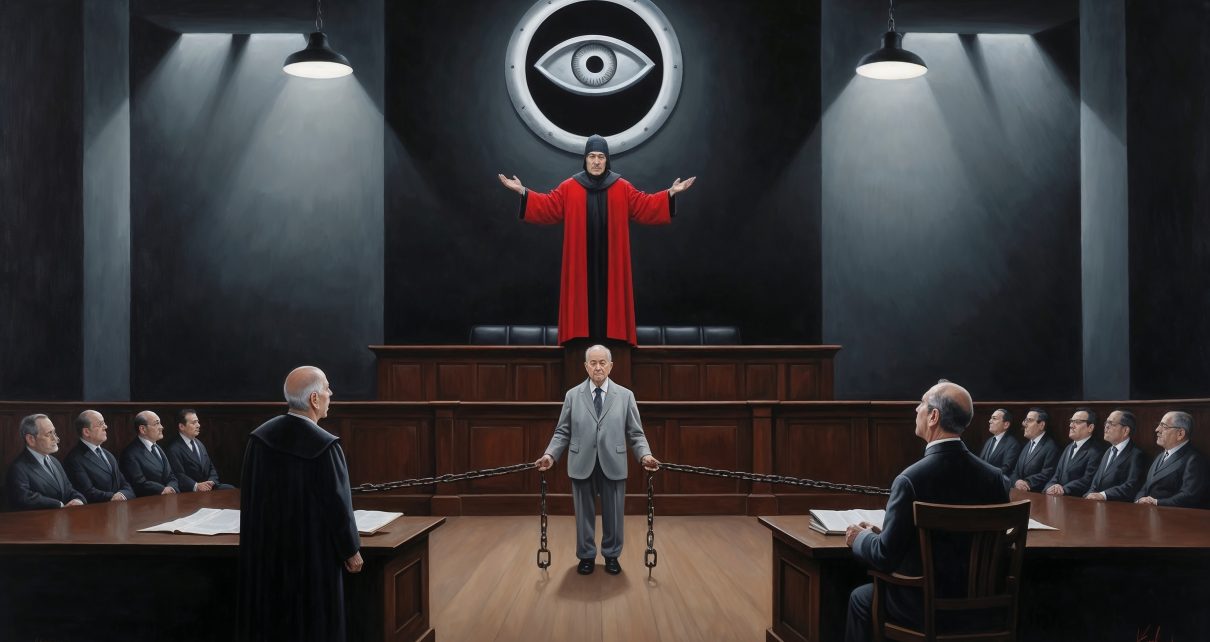By Sean Dempsey, 03/28/2025
This echo-filled chamber of judgment was not built to house men, but to erase them.
Its walls were clean, without seams, without windows, without warmth. Light spilled from hidden fixtures like surgical lamps—cold, clinical, sterilizing. Every sound echoed twice.
Each breath of the men and women in this dim legal sanctuary was State-sanctioned.
At the center of the room stood the Tribunal of the State: three figures elevated on a raised platform of stone and steel, seated behind a barrier of polished black glass. Their faces were nearly identical: pale, impassive, drained of color or care. Behind them, emblazoned across the back wall, was the emblem of the State: a massive silver eye enclosed in a perfect circle of black.
It saw everything.
It judged without blinking.
The air was heavy with a silence so complete that it felt manufactured, like sound itself had been outlawed.
A row of live television screens lined the far wall, feeding images of the proceeding to millions of mandated viewers. Every household, every factory, every communal housing unit—everyone watched. Not because they chose to, but because not watching was a civic infraction. The People’s screens could not be turned off, muted, or ignored. The State saw through them as easily as it saw through walls.
And into this Chamber of Justice stepped Mr. Declan Malum.
He walked with a quiet composure, not pride exactly, but something close…dignity. Dignity, in a place designed to annihilate it.
Malum was sixty-two, gray-haired, neither tall nor broad, but his bearing was unmistakable. He was dressed in a plain gray suit, government-issued like all clothing, but he wore it differently—upright, unbowed. In his pocket, tucked against his chest like contraband, was a page. Just one. Torn from a book, brittle and yellowed, a fossil from a time before the State deemed memory a threat. On that dingy page sprawled the double-underlined words: “Freedom is the freedom to say that two plus two make four. If that is granted, all else follows.”
The Chancellor stepped forward, high above on his podium. He was tall, thin, angular—more architecture than flesh. His uniform was red with silver tassels, the color reserved only for those closest to the State’s ideological core. His voice was cold and mechanized, as though stripped of all humanity by years of recitation.
“Mr. Declan Malum,” said the Chancellor, “you are now called. Step into the light.”
Mr. Malum timidly stepped from the shadows into the acrid spotlight where those accused stood before the Tribunal to receive its righteous judgment.
“You have been summoned before this Tribunal to determine your civic validity. You have been accused of obsolescence.”
The word was spat, more than it was spoken. It was uttered like a curse.
In the sacred creed of the State, utility was virtue, and function the final truth. Those who no longer turned the gears of the machine were not punished, but quietly unmade—methodically, mercilessly, and without the burden of grief. This was the function of the Tribunal: judgment. All in the rabid pursuit of efficiency.
For obsolescence was not merely a condemnation; it was an erasure.
“You have been charged with retaining unauthorized beliefs,” the Chancellor continued. “Beliefs that have been deprecated by the State for their tendency to generate confusion and deviation. You are accused of harboring non-sanctioned untruths and false information. You are accused of possessing spiritual constructs. And, most gravely—you are accused of promoting the idea of the individual.”
Malum did not respond. He stood calmly, hands folded before him, looking not at the Tribunal, but at the great silver eye above them.
“You are … a librarian,” the Chancellor continued, as if describing a species thought extinct.
“I am,” stated Malum, trembling slightly.
The Chancellor narrowed his eyes.
“Books,” he said, “are savage. Obsolete. Their contents are unregulated. Their formats are inefficient. Their messages cannot be corrected once printed.”
“Many hold truths,” Malum said, gaining some confidence.
“No. They are unfiltered. And unfiltered information is dangerous to the coherence of the civic mind.”
“They are memory,” Malum answered. “They are thought. They are warnings whispered from the dead.”
“History,” the Chancellor replied sharply, “can, and must often be, revised for your protection. The State provides a streamlined and error-free version of all past events. Interpretation is a threat. Truth is what aligns with purpose.”
“And your purpose,” Malum said, “is obedience. Not truth.”
A murmur passed through the dark chamber. The dim sounds of men and women in the shadows buzzed with shocked disbelief.
The Tribunal made no expression, but screens across the city flickered with momentary static—censorship algorithms hesitating on how to interpret what had just been said.
“You stand accused in violation of Statute 1106.3: The Rejection of Central Doctrine,” the Chancellor said. “How do you plead?”
“I am perhaps in violation of forgetting who I am,” Malum said. “And I refuse to do so any longer.”
The Chancellor’s voice remained level, but the air itself seemed to tighten.
“You stand also accused of believing in a deity!”
“I do.”
“There is no God.” The Chancellor scoffed, his words dripping with disdain. “The State has disproven the existence of God. Faith is sedition. It is a breach of cognitive conformity.”
“God does not require permission from the State to exist.” Malum exclaimed, his dim eyes for the first time ablaze.
“Mr. Malum, your statement is in direct opposition with collective equilibrium.”
“Then collective equilibrium is incompatible with Truth.”
For the first time, the Chancellor’s expression cracked—only briefly, a hairline fracture in the mask.
“The accused is in contempt of State Doctrine. You are a danger to the People.”
“I am a reminder,” Malum quietly replied.
The Tribunal leaned forward.
“You deny the judgment of the State?”
“Yes. I deny its divinity. And I deny its legitimacy to render judgement over free men.”
“You refuse to affirm its supremacy?”
“I do.”
“You will not confess your obsolescence?”
“I will not.”
“Then,” said the Chancellor, “you will be removed. Efficiently. Within the next 24 hours. However, the State is not without clemency. The method of your termination shall be granted to you…as a final mercy.”
Malum bowed his head and was silent for several seconds. “Then, Chancellor, I choose to die in a secret place of my choosing, at a secret time of my choosing within that appointed time span. And I desire a man of the State to bear witness—and with the People watching. Let them see how a free man dies.”
The Chancellor hesitated briefly and leaned over to an associate behind him in the shadows. The two of them conferred in hushed tones. Then he turned back to the accused and nodded.
“The State approves your request.”
====
The room was small, windowless, and white. The walls were lined with reinforced ceramic, impossible to mark or damage. A chair sat in the center, beside a table. On the table lay a single object: a leather-bound Bible, faded and soft from decades of handling.
Above, a handful of cameras blinked silently. It streamed directly to the CBC, the Central Broadcasting Core—which distributed it to every screen across the nation.
The Chancellor entered, composed but clearly agitated.
“You’ve created a spectacle,” he said.
“I’ve created a choice,” Malum replied.
The door clicked shut behind them.
“You understand you will die soon,” said the Chancellor.
“Yes.”
“Your allotted twenty-four hours is nearly up as you know. You called me here to attend you before you are led off to die? A strange choice, choosing me as your attendant. Surely you must have known I would decline.”
“But you did come. I expected no less.”
“Oh? You show great hubris, Mr. Malum. How did you figure that?”
“The State has no real enemies other than those who defy it. The People are its true enemy. You, as the State’s titular head, would never pass up an opportunity to crush that which can bring you to your knees.”
“Ha. You speak of yourself? You? A condemned old man – you would bring down the State singlehandedly. You think far too highly of yourself, methinks. After today, no one will remember you.”
“On the contrary,” Malum said. “They will remember everything.”
The Chancellor sat stiffly. He peered around and then eyed the leather-bound book with disdain.
“Such items are banned.”
“Then it is good you are here to witness its final reading.”
The Chancellor folded his arms.
“This is theater.”
“This,” Malum said, opening the book, “is testimony.”
===
Time passed.
Malum read softly, almost inaudibly. His voice was measured, peaceful. Words of psalms, of ancient prophecy, of rebellion and redemption.
After succumbing to apparent boredom, the Chancellor looked at his watch and then spoke up; Malum lowered the book to his lap. “Mr. Malum. How tragically small you are! You are a lonely pigeon that flies against the might of a fierce and raging hurricane. You are a worm. You are a pestilence. You’re a disease! Don’t you see? You and your breed seed distrust. Your nonconformity is disturbing. It distresses and it wears away at the sanctity of the State’s united peace. When all citizens think the same, there is no argument. When there is no argument, there is no discomfort. We have perfected harmony.”
“No, dear Chancellor, you have only silenced debate. You have snuffed out all light and forced everyone to live in darkness and celebrate the night.”
“The State has ended suffering,” he replied. “Through war, it has united the people and eliminated dissention. We have no internal unrest. Our unity brings us strength.”
“You have no freedom,” Malum answered.
“Freedom breeds chaos. It is the toxin from which we have cured the body of mankind.”
“No,” Malum said. “You have lobotomized the mind of mankind. You’ve burned the house to kill the moth.”
“You still believe in moral individuality. That is an archaic defect.”
“I believe,” Malum said, “in the soul.”
The Chancellor stood and faced the rolling cameras for effect and with full bravado stated, “Then you are truly lost, Mr. Malum.” He went to the door. It did not open.
He turned.
“What is this?”
“This is education,” said Malum.
“You’ve locked the door?”
“Yes.”
“You think yourself clever? I need only say the word and guards at my employ will rush to open this door immediately.”
“If that is your wish. But, remember, the State in its divine wisdom granted my wish. Do you not recall?”
The Chancellor became flushed in the face, consciously aware he was being filmed and his every move beamed to millions of citizens. “What do you mean?”
“You, yourself, permitted that my sentence of death be at a time and place of my choosing. This was my choice. I picked a locked room. This very room, Chancellor, rather than some dark euthanasia chamber as you might have hoped. Poison gas will be pouring into my study in just a few more minutes. I’ve asked the door to be locked and all cracks sealed.”
“Ha, what a pitiful and half-hearted ploy, Mr. Malum. Again, I say, you think at my request the door will not be flung open and I released? What purpose is this tired charade?”
“If that is your wish, I’m sure it would be done, Chancellor. And in doing so would not the millions now watching see the greatness of the State reduced to a mere man – a simple man, mind you, just like any one of them, or like myself even – a man made venerable and in need of rescue. A man in need of salvation! How pitiful for the State to be reduced so! So, please call for your guards to come and rescue you from perdition. I’m sure it will be done. You are the State, are you not?”
The Chancellor turned to the door and opened his mouth to call for assistance, then stopped. The words of the accused seem to have forestalled him. He began to think.
Finally, after a moment he spoke quietly. However, his composure had left him. His words, though deliberate, were filled with dark emotion. He seemed almost to spit as he spoke, “You’re a small man, Mr. Malum. A very small man. Like a rat caught in a giant engine, you think yourself bigger or more important than you are. I am the State itself; and I shall grind you up and spit you out as easily as I might swat a fly.”
Mr. Malum placed his Bible on the desk and looked deep into the Chancellor’s red and bloodshot eyes. He did not speak for a long time, then finally he looked into the cameras around his room—the same cameras positioned there in order to best capture his smallness in stark contrast to the might of the omnificent State. He spoke with deep conviction:
“Chancellor, a single pebble’s touch can redirect a surging river.
For, Chancellor, you are NOT the State. You are a Man. A man like any man.
You ask this free man to kneel.
But I shall not.
You ask this free man to affirm that the State is supreme.
But I shall not.
You ask this free man to reject the whisper within—the voice of conscience, of wonder, of God.
But I shall not.
For I have seen the machine you have built.
I have walked through its corridors of silence.
I have looked into the eyes of men who once dreamed—and now only function.
I do not deign to call that progress.
You say books are obsolete.
Then why do you ban them?
You say God is obsolete.
Then why do you tremble when His name is spoken?
You say man is obsolete.
Then why do I, a simple and unimposing man, haunt you?
The State does not rule. It replaces.
It replaces truth with repetition.
It replaces memory with data.
It replaces soul with circuitry.
You have not freed humanity—you have formatted it.
A ‘perfect society,’ you claim.
But perfection in your terms is stagnation.
You have eliminated questions to avoid answers.
You have removed suffering not with compassion, but with sedation.
You do not build—you sterilize!
You do not love mankind. You fear it.
You fear man’s contradictions.
You fear his hunger for meaning.
You fear that one thought, spoken aloud, can unravel a thousand laws.
You surveil not to protect, but to suppress.
You listen not to understand, but to condemn.
You rewrite language until war becomes peace,
until slavery becomes freedom,
until silence becomes truth.
But words remember what they mean.
And so do we.
I am obsolete because I do not conform.
Because I ask.
Because I read.
Because I pray.
But if these are crimes,
Then I am proud to be guilty.
The State has no soul.
No blood.
No heartbeat.
It does not live. It runs—
like a program,
looped infinitely,
devouring what it cannot control.
You say I must serve to have worth.
But a man’s worth does not reside in his output;
it resides in his awareness—In his refusal to lie.
In his ability to say no, when everything demands yes.
You call me a danger.
And I am!
Yes, truly, I am a danger to the State.
Because I remember.
Because I believe.
Because I see through the veil.
You fear the man who speaks aloud,
But you fear more the man who speaks to himself—
Who closes his eyes and dreams.
Who writes a single word on a scrap of forbidden paper.
You fear that the soul cannot be indexed.
That it cannot be scanned, or ranked, or removed.
And you are right to fear it.
For in the eyes of God,
There is precious little to distinguish one man from another.
The Chancellor and the laborer.
The prisoner and the politician.
The bureaucrat and the prophet.
All are equal before judgment.
You will destroy my body.
You will erase my records.
You will delete my image.
But my words—
My words have already left your grasp.
They move now, hand to hand,
Mind to mind,
Quiet as breath,
Sharp as fire.
You cannot stop what you cannot see.
You cannot kill what you do not understand.
I am not your enemy.
I am your reckoning.
The State is not God.
The State is not eternal.
And though your towers may stand for a time,
Rust comes for iron.
Rain comes for walls.
And truth—truth always comes for tyrants!
I am not afraid.
I have lived free.
I shall die free.
And in that dying,
I will become a witness.
A witness to your failure.
A witness to your fear.
A witness to the simple dignity of man.
I did not kneel.
Remember that.
I did not kneel.
For I am a free man.
The Chancellor, however, was not listening. He was now on his knees—begging to be released from the room. The poison gas was pouring in. And his world was unravelling.



